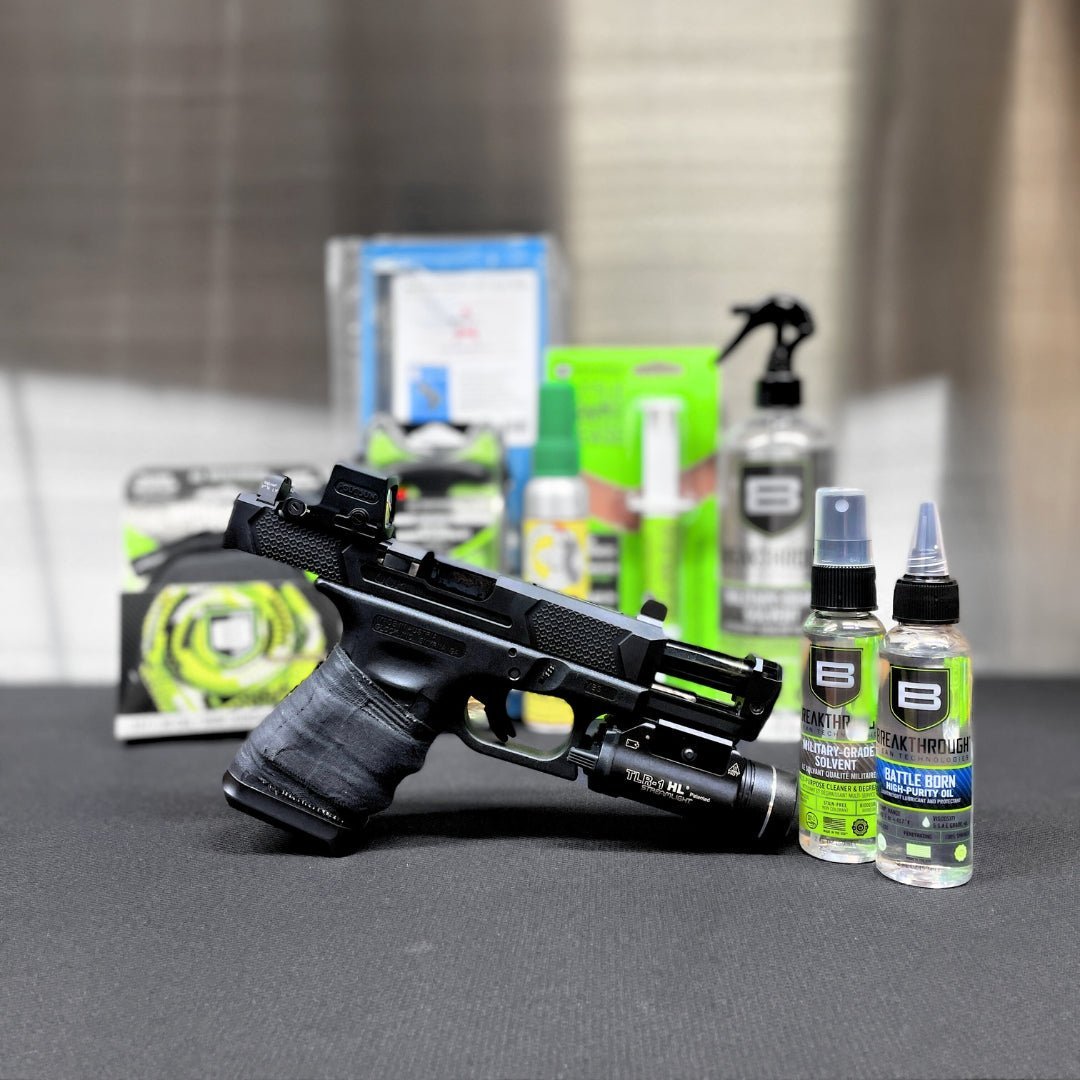Understanding Corrosion Threats to Firearms
Corrosion is one of the fastest ways to damage firearms. Rust weakens parts, affects accuracy, and reduces reliability. Knowing the main corrosion threats helps you prevent costly damage before it starts.
Common Corrosion Threats to Firearms
Humidity and Condensation
High humidity, rapid temperature changes, and poor ventilation cause moisture to form on metal surfaces. Gun safes, cases, basements, and garages are common areas where hidden condensation and rust begin.
Sweat, Fingerprints, and Salts
Skin oils, sweat, and fingerprints contain salts and acids. These contaminants attack blued, parkerized, and bare steel. Unwiped handling marks often become the first visible rust spots on firearms.
Fouling, Powder Residue, and Dirty Storage
Carbon, copper, and powder fouling trap moisture and corrosive particles. Storing a dirty firearm accelerates rust, especially in closed spaces without direct protection on exposed and internal metal surfaces.
Trapped Moisture in Cases and Foam
Foam-lined cases, soft sleeves, and poorly ventilated containers absorb and hold moisture. When left closed, they press that moisture and residue against metal, creating an ideal corrosion environment.
How to Protect Firearms from Corrosion
Step 1: Clean Thoroughly After Use
Always unload and clear the firearm. Remove fouling, residue, and fingerprints from all metal surfaces. Use quality cleaners approved by your firearm manufacturer to avoid damaging finishes.
Step 2: Apply Proper Lubrication
Apply a light coat of quality gun oil on exposed steel and high-friction parts. Avoid excessive grease for normal storage, unless specified by a technical requirement or extreme-use environment.
Step 3: Control Humidity in Storage Areas
Place safes and cabinets in stable, dry locations. Use a gun safe dehumidifier or desiccant packs to reduce moisture. Humidity control supports protection but should be paired with direct metal defense.
Using VCI Gun Storage Bags for Active Protection
Arms Preservation Inc. VCI gun storage bags create a controlled micro-climate around each firearm. Vapor Corrosion Inhibitor molecules are built into the film and activate when the bag is sealed.
These molecules are attracted to metal surfaces. They form a thin, invisible layer that helps block moisture, oxygen, and corrosive contaminants on visible and hidden areas.
Benefits of Arms Preservation Inc. VCI Gun Storage Bags
- Multi-layer barrier film for strong VCI retention and durability.
- Hook and loop style closure for fast, repeatable sealing and reuse.
- Protects internal parts, tight spaces, and critical contact surfaces.
- Made in the USA for serious shooters, collectors, and professionals.
Best Practices for Long-Term Firearm Corrosion Protection
- Unload and verify each firearm is safe before storage.
- Clean thoroughly and remove fingerprints, fouling, and moisture.
- Apply light lubrication where recommended by the manufacturer.
- Place each firearm in a correctly sized VCI gun storage bag.
- Seal the hook and loop closure completely to trap VCI vapor.
- Store sealed bags in a safe with controlled humidity.
This layered strategy helps prevent rust caused by humidity, residue, and poor storage conditions.
Learn More About Firearm Rust Prevention
See how our VCI technology works in detail on the How It Works page.
Get a complete explanation of VCI performance in How Do VCI Storage Bags Work?
Choose pistol, rifle, and ammo protection from our VCI gun storage bags collection.
Find additional corrosion prevention answers in the VCI FAQ.
FAQ: Corrosion Threats to Firearms
What is the biggest cause of firearm rust?
Trapped moisture combined with salts, fingerprints, and fouling is the most common cause. Closed safes and cases without direct protection increase this risk.
Are VCI gun storage bags safe for modern finishes and optics?
Arms Preservation Inc. VCI bags are formulated for common firearm finishes, optics, polymers, and wood stocks. Follow manufacturer guidance for any unique or highly specialized coatings.
Do I still need a dehumidifier if I use VCI gun storage bags?
Using both is recommended. VCI bags protect metal surfaces directly. A dehumidifier or desiccant helps manage overall humidity inside the safe or storage area.
How often should I inspect stored firearms for corrosion?
Inspect firearms regularly, especially during humidity changes or seasonal shifts. Confirm VCI bags are sealed and storage conditions remain clean and dry.



0 comments